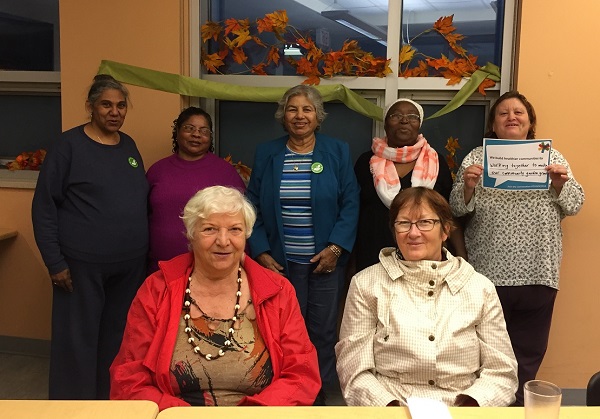
Community Development Worker Andrew Sweetnam says his main job is giving people chances and opportunities to come together, to learn, and to be well.
Healthier Community Builders work in partnership and cooperation with others to create the conditions for everyone to achieve their best possible health and wellbeing. We put the spotlight on these local heroes to bring their work into wider discussions of what it means to build healthier communities. This week, the spotlight is on community gardening at North Hamilton CHC.
When you first enter a group meal and end-of-year celebration of the North Hamilton Community Health Centre gardening group, you might feel like an outsider – for about five seconds. Then someone offers you a plate, and some home-cooked stew, while someone else passes you the bread and butter, and the lady next to you fills your cup. You might be new to this group, but their first message is: you’re welcome here among us. Their second is: What kind of tomato do you like to grow?
Community Development Worker Andrew Sweetnam isn’t about to take credit for the familial atmosphere among the gardening crew he supports.
“My role is a facilitator,” he says. “We initiate the contact people have in groups, but then it’s sort of up to them where they want to go, and how they want to connect. That’s kind of how it should be.”
Many people in the group, he notes, might otherwise be quite isolated, but those who’ve been gardening for a few years have built some strong ties that are sustained beyond the growing season. So while there is some discussion about practicalities for the spring (chief among them the desire for a new wheelbarrow for moving soil and compost to gardeners’ plots), there’s much more discussion about who had the best tomatoes of the season, who has family coming into the city for the holidays, and when they might see each other next.
“We have heard that some of the gardeners who are alone over the holidays, a group of them come together to have a meal together, outside of the garden group and the CHC,” Sweetnam says. “A lot of them have become good friends from meeting and working together in the gardens. That’s the best outcome we could hope for.”

And in terms of outcomes, Sweetnam and other Community Health Workers across Ontario know that gardens are one of the best and most cost-efficient ways to get people thinking more deeply about their diets and health. In fact, research has shown that there may be "measurable impacts on BMI" over time, helping people to battle obesity, among other health and social benefits. Community gardening may also help reduce food insecurity as well as strengthen relationships, according to other research from the U.S.
In his work at North Hamilton CHC, Sweetnam is always looking for ways to enhance the experiences of participants in programs like the gardening group. One of his latest involved seniors getting together in the CHC’s greenhouse space for a mindfulness and growing workshop. A little different from community gardening, this program focused on getting people in touch with the food they eat. Getting the group to think about what they consume -- and supporting those efforts through workshops with dietitians, and mindfulness activities such as drying herbs and making tea with them -- puts people in a better position to take control of their diets, Sweetnam says. Through shared meals, too, people who were isolated have chances to connect and share their experiences of eating healthy (and its challenges) with those around them.
Taking control of diet and eating healthy are important factors for many of the CHC’s clients who are living with multiple chronic conditions. Groups and workshops like the ones that Sweetnam facilitates give people a chance to take control of their own health and achieve their best possible wellbeing. It’s the Model of Health and Wellbeing in action.
“It’s more than just sharing seeds and plants,” Sweetnam says. “It’s also sharing a healthy lifestyle, sharing stories, sharing meals. The number one reason people come out, though, isn’t for the food. They come out to be with others, to make friends, to find a place where they belong.”

